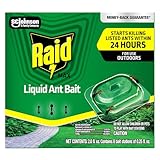If you live in a place where the winters are cold, ants may seek shelter in your house during the winter months. Ants’ activity usually decreases during the colder months and a lot of species become dormant. However, some may still be active and cause an infestation.
To get rid of ants in the winter, ant baits are a highly effective method. Take proactive measures such as performing a deep clean in the fall and making your home less appealing to ants all year-round by storing food in the fridge, cleaning up food spills, and removing trash frequently.
Have you ever wondered what happens to ants during winter? Or how to get rid of them in different rooms of your home? In this article, we will discuss common types of ants that are prevalent during winter.
Ants in Winter | FAQ
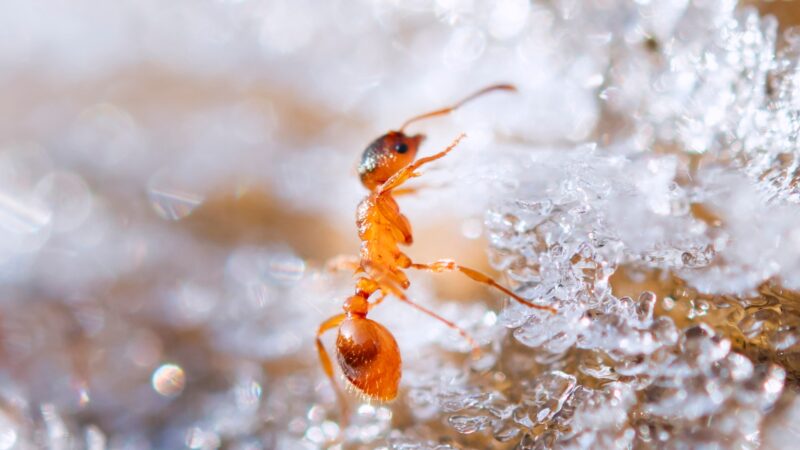
Where Do Ants Go in the Winter?
Ants are cold-blooded so when is colder outside, they begin searching for a warm place. Unfortunately, your house can become a perfect shelter for their colony. Another thing that attracts ants is food, and the chances are that your house is full of things that they consider a food source.
How Do Ants Spend the Winter?
Different ant species choose their own methods of coping with the cold. Some ants prefer to live under a rock (this helps them “collect” heat from the sun). Others use decomposing leaves for the same reasons, while some species build mounds with a complicated system of tunnels.
When winter comes, the behavior of ants changes. While some species use the strategies mentioned above, others hibernate.
Do Ants Die in the Winter?
You might already know that some species of ants have a relatively long lifespan. There are ants that can live up to 15 years. That means that ants, unlike a lot of other insects, can survive the winter.
Of course, a drastic temperature drop will certainly kill them, but, in most cases, ants either go into hibernation mode or find ways to keep themselves warm. This is why houses are so attractive to them during the winter.
Do Ants Hibernate in the Winter?
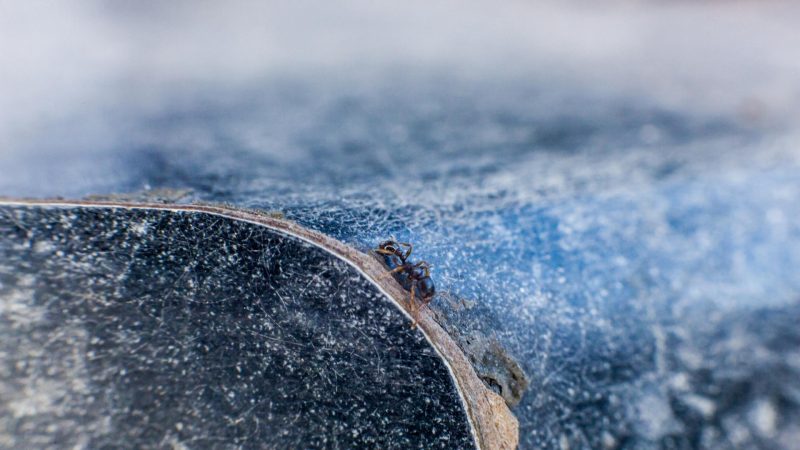
A lot of ants hibernate in the winter. That’s one of the reasons why these insects are not as widespread during the colder months as they are in the summer. The body temperature of the ants falls greatly during the winter. They find a relatively warm place, where they can hibernate restlessly.
Because of the fact that the ants aren’t moving from one place to the other, the entrances to their nests get covered during winter and are extremely hard to find.
How Do Ants Survive Winter?
Ants need to find a way to keep themselves warm during winter. Building nests under leaves or rocks can help. Some of them go into hibernation mode, while others can use your house as a shelter that will help them survive the winter.
Is It Common to Have Ants in the Winter?
It is not common to see ants walking around your home during winter as it is with other seasons. However, if there is a colony at your place, it will remain active even during the colder months. If you see flying ants during winter you are in real trouble as you have a serious infestation in your house and you should call professional pest exterminators right away.
Do Ants Store Food for Winter?
Most ants don’t store food but there is one ant species that is famously active during the winter and that does store seeds as food. This species of ants is called Messor aciculatus, they store plant seeds during fall and feed on them when winter arrives.
Other ant types do not store food and a lot of other insects prefer to eat more and put on fat, in order to survive the coldest season. There is also one other ant in the USA that is called a “winter ant” but they are not really dangerous and don’t infest homes.
Related: How to Get Rid of Ants in Hot Tub | A Complete Guide
Common Types of Ants to Encounter During Winter
There are some ant species that are more likely to invade your house during the winter.
Carpenter Ants in Winter – Black Ants
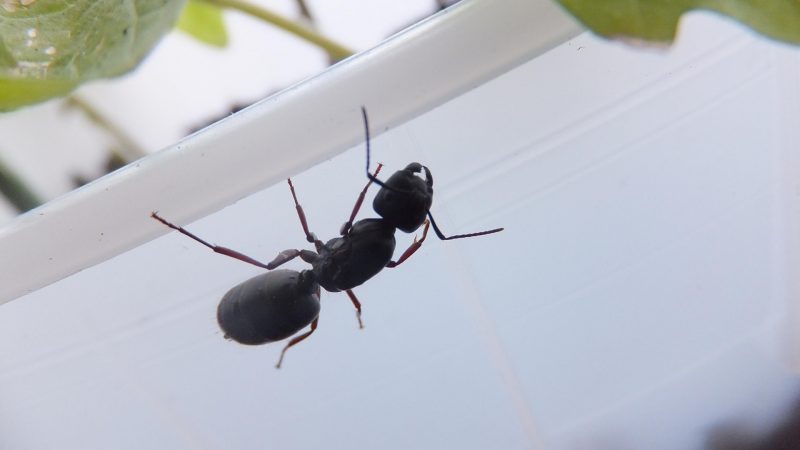
When the temperature drops, carpenter ants begin to hibernate. However, there are exceptions. What do carpenter ants do in the winter? If the temperature outside is not low enough, carpenter ants won’t go into hibernation mode.
In case they manage to build a nest in your house, they may remain active throughout the whole winter. By the way, their colony can also revive from the dormant state, for example, if you start using the fireplace and the temperature in the house rises they will become active.
Related: How to Get Rid of Carpenter Ants Without an Exterminator
Odorous House Ants in Winter
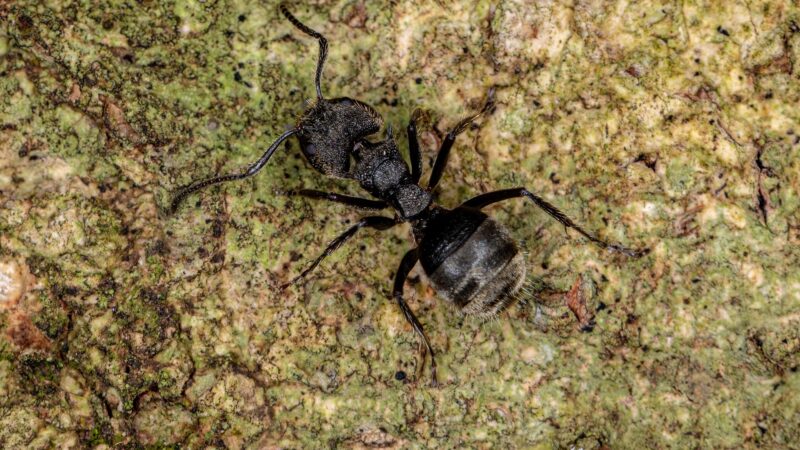
Odorous ants are more active during spring and summer. As soon as it gets cold, they prefer to settle in their nest. However, they might remain active under certain circumstances. Odorous house ants like to build their nests near heaters and inside insulated walls.
Related: How to Get Rid of Odorous House Ants: A Complete Guide
Pavement Ants in Winter
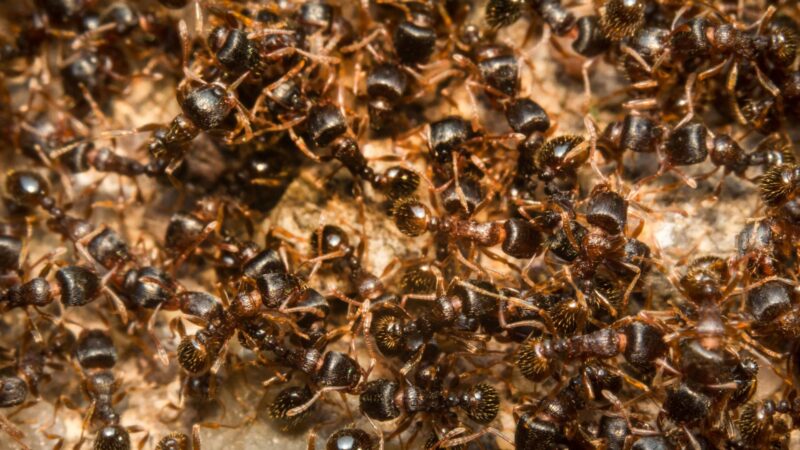
Pavement ants are one of the most common types that can be spotted during winter. These creatures often nest under driveways and sidewalks or beneath a heated concrete foundation. If these ants manage to keep themselves warm during winter, they will remain active.
Related: How to Get Rid of Pavement Ants: A Complete Guide
Tiny Black Ants in Winter
You certainly may encounter tiny black ants in your house during winter. These insects may stay active or revive from the dormant state if something disturbs the nest. For example, water from the melting snow.
Fire Ants in Winter
During winter months, fire ants will choose to go deeper and deeper into their mound. Usually, these insects prefer to hibernate, but, just like with the other ant types, there can be some exceptions.
Related: How to Get Rid of Fire Ants: A Complete Guide
Small Brown Ants in House Winter
Small brown ants prey on insects and collect waste. They might enter your house in search of food, but in the absolute majority of cases, these ants live outdoors.
How to Get Rid of Ants in the Winter: Instructions

Step 1: Cleanliness
As we know, food is one of the primary attractants for ants in your home. To prevent ant infestations, it is crucial to keep your home clean. Seal pantry items in containers or plastic bags, store food in the refrigerator, regularly clean floors and counters, and refrain from leaving pet food on the floor, except during mealtimes. Additionally, take out the trash as frequently as possible.
For extra precaution, consider wiping down the counters and sink area with a mixture of vinegar and water.
Step 2: Resolving Entry Points
Ants can enter your home through cracks or overhanging tree branches that are close to the exterior walls. Additionally, ants may establish a nest within your walls or floor. It is crucial to ensure that there are no entry points that ants can utilize to invade your home.
It is best to take preventative measures during the fall to eliminate ants before winter arrives. Prevention is indeed better than cure.
Step 3: Insecticide
If you have noticed ants in your home during winter, using ant bait may be an effective solution. Ants that consume the bait will carry the poison back to the nest, ultimately eradicating the entire colony.
Ant baits are effective for various ant species during the winter period.
- ATTRACTS & KILLS: TERRO liquid ant baits indoor effectively...
- KILLS THE ANTS YOU DON'T SEE: TERRO ant bait is designed to share...
- FAST-ACTING: Noticeable ant activity reduction within days as...
- READY TO USE: Simply place ant baits indoors with no setup...
- VERSATILE HOME PLACEMENT: TERRO ant traps are ideal for use along...
- One 8 count package of Raid Ant Killer Baits protects against...
- Raid Ant Killer works for up to 3 months to help control ants in...
- This pest killer comes in convenient Raid Ant Traps where ants...
- Raid Ant Killer is ideal for use throughout your home, including...
- Try other Raid bug spray and insect killer products for all of...
- Kills listed ants at source* *excluding carpenter, harvester,...
- Kills ants, queen and larvae at the source
- Affects whole population, as ants carry bait back to colony
- Contains 8 ready-to-use, spill-proof bait stations
- Pre-filled and ready-to-use. No mess. No spill. No leak.
- ATTRACTS & KILLS: Effectively targets and eliminates common...
- KILLS THE ANTS YOU DON'T SEE: Terro ant bait is designed to share...
- FAST-ACTING: Noticeable ant activity reduction within days as...
- READY TO USE: Simply place ant baits indoors with no setup...
- VERSATILE HOME PLACEMENT: Ideal for use as terro ant traps along...
Ants in Specific Rooms in the House during the Winter
Ants in Bathroom in Winter
Ants are not only attracted to food but also to water. This is why they often build their nests near bathrooms. Additionally, during winter, the bathroom can provide a warm environment for ants to thrive.
If you are experiencing an infestation in your bathroom, it is essential to address any moisture issues. Fix any water drainage problems or leaking faucets, and dry surfaces such as the floor and sink after taking a shower or bath. Adequate ventilation is also crucial for preventing ant infestations.
Ants in Basement During Winter
If you find ants in your basement during winter, it is likely that they have established a nest there. Ants may be attracted to food sources in the basement, including pet food, pantry staples, and even damp wood or leakages. Additionally, cracks and holes in the basement can provide entry points for ants to invade.
Ants in My Kitchen in Winter
During winter, ants may consider your kitchen a prime location for foraging, as food sources outside are scarce. To prevent ants from invading your kitchen, ensure that access points are sealed, food is stored properly, and the kitchen is kept clean. Additionally, consider using recommended ant baits to eliminate the entire nearby colony.
Related: Ants in Kitchen: How to Get Rid of Ants in the Kitchen
List of Sources
Lewis D., Carpenter Ants in the Winter, Iowa State University
Ants, Illinois Department of Public Health
Insects Are Still Active In Winter, Texas A&M AgriLife Extension Service
- How to Get Rid of Copperheads | Practical Guide - August 27, 2023
- How to Get Rid of Corn Snakes | What Makes Them Aggressive? - August 27, 2023
- How to Get Rid of Alligators | Safety Measures and Removal Methods - July 16, 2023



